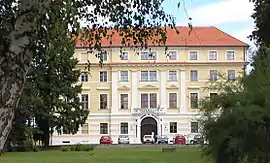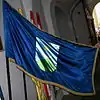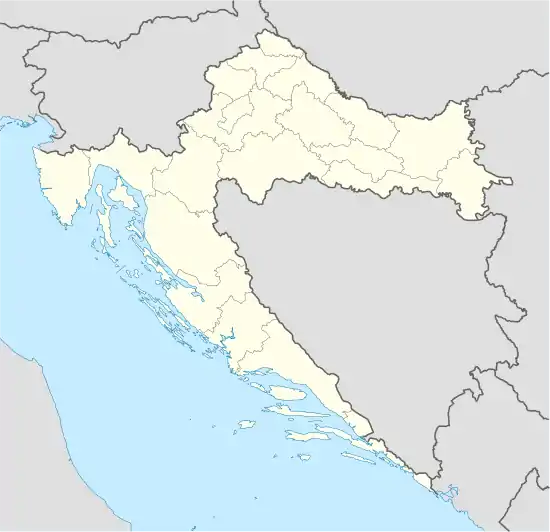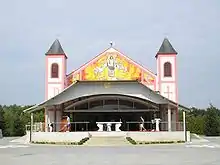Ludbreg
Ludbreg is a town in Croatia, located halfway between Varaždin and Koprivnica near the river Drava. It has 3,603 inhabitants, and a total of 8,478 in the entire municipality (census 2011).[2]
Ludbreg | |
|---|---|
| Grad Ludbreg | |
      Ludbreg | |
 Flag | |
| Nickname(s): Center of the World[1] | |
 Ludbreg Position of Ludbreg in Croatia | |
| Coordinates: 46°15.0′N 16°36.6′E | |
| Country | |
| County | |
| Government | |
| Population (2011)[2] | |
| • Total | 8,478 |
| • City itself | 3,603 |
| Time zone | UTC+1 (CET) |
| • Summer (DST) | UTC+2 (CEST) |
| Website | http://www.ludbreg.hr |
History

For centuries Ludbreg has been a popular place of pilgrimage. In 1320 the city was mentioned for the first time as Castrum Ludbreg, when owned by Hungarian noble Nicholas Ludbregi. The name of the town comes probably from a crusader named Lobring, who founded the settlement. The renovated Castle of Batthyány is home to a well-known restoration workshop. Ludbreg is also a region of vineyard cultivation (especially Riesling and Graševina).[3]
The town became famous after the eucharistic miracle, that happened in the castle chapel in 1411 and was investigated and confirmed by pope Leo X in 1513.
In the late 19th and early 20th century, Ludbreg was a district capital in the Varaždin County of the Kingdom of Croatia-Slavonia.
On the 24th April 1932, the town saw a protest that was one of the earliest open acts of resistance against the 6 January Dictatorship[4]
Municipality
The following settlements comprise the Ludberg municipality:[2][5]
- Apatija, population 250
- Bolfan, population 413
- Čukovec, population 322
- Globočec Ludbreški, population 491
- Hrastovsko, population 760
- Kućan Ludbreški, population 186
- Ludbreg, population 3,603
- Segovina, population 37
- Selnik, population 844
- Sigetec Ludbreški, population 667
- Slokovec, population 257
- Vinogradi Ludbreški, population 648
Notable people
- Rudolf Fizir (1891–1960), airplane constructor[6]
- Mladen Kerstner (1928–1991), writer[7]
- Tomislav Mužek (born 1976), opera singer
- Vladimir Filipović (1906–1984), philosopher[8]
- Sara Kolak (born 1995), javelin thrower
- Mladen Pavković (born 1951)
References
- "Welcome to the Center of the World". Touristic Board of Ludbreg (in Croatian). Retrieved 2009-03-19.
- "Population by Age and Sex, by Settlements, 2011 Census: Ludbreg". Census of Population, Households and Dwellings 2011. Zagreb: Croatian Bureau of Statistics. December 2012.
- Tourist Board of Ludbreg Archived 2009-05-18 at the Wayback Machine
- Opozicija u vreme šestojauarske diktature 1929-1935, Dr Todor Stojkov
- Official Website of Ludbreg Archived 2007-04-18 at the Wayback Machine
- www.villa-pape.com/famous-croatians
- Mladen Kerstner in the library of Ludberg Archived 2007-12-29 at the Wayback Machine
- Zenko, Franjo: Novija hrvatska filozofija, Zagreb, 1995.
